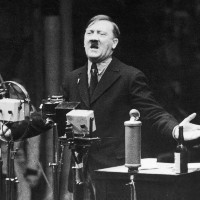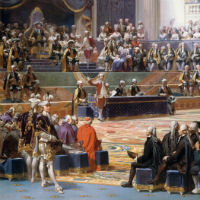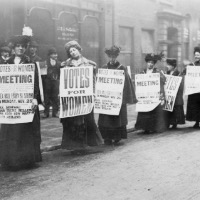History of Germany, 1815-1990
This playlist covers the history of Germany from the Battle of Waterloo (1815) to the Reunification of Germany in 1990.
What this playlist includes:
86 lectures across 13 courses.
All resources designed and delivered by university academics and researchers.
Courses and Lectures
1. Germany – The Unification of Germany, 1815-71
Dr Anna Ross
University of Oxford
University of Oxford
1.1. What was Germany like in 1871? – 07:28
1.2. How important was the growth of national identi... – 09:28
1.3. How did the authorities react to 1848? – 09:15
1.4. What role did international circumstances play ... – 10:19
1.5. What role did individuals and the military play... – 10:18
2. Germany – The First World War, 1914-18
Prof. Matthew Stibbe
Sheffield Hallam University
Sheffield Hallam University
2.1. The Myth of War Enthusiasm – 13:04
2.2. Economic Mobilisation – 12:36
2.3. Internal Opposition to the War – 07:59
2.4. Unrestricted Submarine Warfare – 10:37
2.5. The End of the War – 13:48
3. Germany – The Early Years of the Weimar Republic, 1918-23
Dr Nadine Rossol
Essex University
Essex University
3.1. The Last Years of the War – 07:17
3.2. The German Revolution – 08:10
3.3. The Spartacist Uprising – 06:11
3.4. The New Constitution – 05:15
3.5. The Treaty of Versailles – 04:23
3.6. The Kapp Putsch – 07:34
3.7. Hyperinflation, the Ruhr Crisis and the Beer Ha... – 07:48
3.8. Conclusion – 04:21
4. Germany – The Weimar Republic, 1918-33
Prof. Matthew Stibbe
Sheffield Hallam University
Sheffield Hallam University
4.1. Was Weimar Germany doomed to fail from the start? – 18:41
4.2. Why did Weimar fail in the early 1930s? – 14:19
4.3. How much of a problem was political extremism f... – 11:57
4.4. What kind of elections took place in Weimar Ger... – 13:41
4.5. How did the design of the West Germany constitu... – 13:01
4.6. What was the impact of hyperinflation in Weimar... – 12:19
4.7. How successful was the Weimar economy in the ye... – 16:34
4.8. What was the impact of the Wall Street Crash on... – 11:06
4.9. Did living standards improve in the Weimar period? – 10:42
4.10. What was Weimar culture? – 10:38
4.11. Did the lives of women improve in the Weimar pe... – 11:52
4.12. How did ethnic minorities fare in the Weimar pe... – 10:27
5. Germany – The Weimar Republic, 1918-33
Prof. Benjamin Ziemann
Sheffield University
Sheffield University
5.1. Introduction – 02:23
5.2. The Beginnings of Weimar Germany – 12:38
5.3. Political Fragmentation – 13:35
5.4. The Politics of Republicanism – 10:48
5.5. The Appeal of the Nazi Party – 11:05
5.6. Crisis and Destruction of a Polity – 17:54
6. Germany – The Rise of the Nazi Party, 1918-33
Prof. Sir Richard Evans
University of Cambridge
University of Cambridge
6.1. Timeline – 10:32
6.2. Did Proportional Representation Cause Political... – 05:37
6.3. Did the Power and Personality of the President ... – 07:24
6.4. Was the Weimar Republic Undermined by Inflation? – 08:23
6.5. Was the Republic Destroyed by the Depression? – 08:05
6.6. Did Hitler Come to Power Legally? – 08:57
7. Germany – Sport and Physical Culture, 1919-33
Dr Jon Hughes
Royal Holloway, London
Royal Holloway, London
7.1. Introduction and Context – 10:33
7.2. The Emergence of Sportsmania – 08:27
7.3. The Golden Age of Sports – 07:14
7.4. Sport in Art and Culture – 08:25
7.5. The Politics of Sport – 09:46
8. Germany – Nazi Germany, 1933-45
Prof. Neil Gregor
Southampton University
Southampton University
8.1. The Ideology of the Nazi Party – 07:36
8.2. The Nature of the Nazi Government – 09:38
8.3. Establishing a Dictatorship – 13:28
8.4. Foreign Policy – 07:22
8.5. Opposition and Dissent – 09:46
8.6. Terror and Repression – 08:48
8.7. Consensus and Support – 10:16
8.8. Women – 07:20
8.9. Education and Culture – 07:49
8.10. The Holocaust – 09:22
9. Germany – Nazi Germany, 1933-45
Dr Lisa Pine
London South Bank University
London South Bank University
9.1. The Rise of Nazism – 12:09
9.2. The Great Depression – 10:38
9.3. Who voted for the Nazis? – 15:02
9.4. Propaganda and the Hitler Myth – 14:27
9.5. Coercion and Terror – 14:39
9.6. Women in Nazi Germany – 11:11
10. Germany – The Nazi Concentration Camps, 1933-45
Prof. Nik Wachsmann
Birkbeck College, London
Birkbeck College, London
10.1. Introduction – 08:01
10.2. The Early Camps – 09:37
10.3. Perpetrators – 10:54
10.4. Prisoners – 09:27
10.5. The Holocaust – 10:37
10.6. The Public and the Camps – 08:13
11. Germany – Life in East Germany, 1949-89
Dr Marcel Thomas
Manchester University
Manchester University
11.1. Why was housing seen as so important to the bui... – 08:13
11.2. Were women more emancipated in East Germany tha... – 09:56
11.3. To what extent did Stasi surveillance shape lif... – 13:22
11.4. How important was repression for the stability ... – 08:22
11.5. What was the role of the Protestant church in E... – 10:13
11.6. How did Ostpolitik change relations between Wes... – 10:37
12. Germany – West German Student Movement, 1966-69
Dr Hanno Balz
University of Cambridge
University of Cambridge
12.1. Traditions of Protest – 09:23
12.2. Confronting the Nazi Past – 09:26
12.3. Internationalism and Global Revolution – 06:25
12.4. The Escalation of 1967-68 – 05:51
12.5. Women's Liberation and the Fragmentation of the... – 05:46
13. Germany – The Decline of the GDR, 1980-90
Prof. Anna Saunders
Liverpool University
Liverpool University
13.1. To what extent did economic factors accelerate ... – 08:29
13.2. To what extent were Gorbachev’s policies respon... – 07:13
13.3. To what extent was the Protestant church signif... – 12:10
13.4. To what extent did external influences contribu... – 07:47
13.5. How important was popular dissent in bringing a... – 10:37
13.6. How accurate is it to say that Helmut Kohl was ... – 11:33
What Next?
Check out these other playlists within History:



